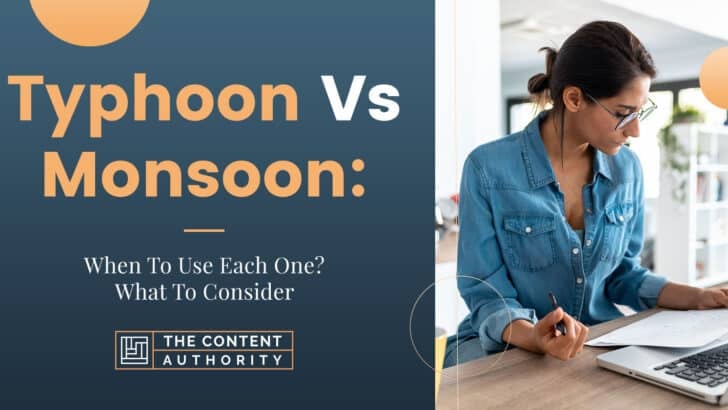Typhoon vs monsoon; what is the difference between these weather phenomena? Differentiating these words can be difficult because of their related meanings. Let’s shed some light on the differences between these words.
A typhoon is a weather element in the Northwestern Pacific equivalent to a hurricane or a cyclone in the Indian Ocean, Indonesia, or Australia. It is a violent whirlwind in the Chinese seas. In contrast, a monsoon is any of several winds associated with regions that experience specific rainfall seasons.
You can tell the variation between monsoon and a typhoon from their spellings. However, you will realize more similarities when you look at their definitions. Read on as we take you through the definitions and uses of these words.

Definitions Of Typhoon And Monsoon
The correlation between these words is not as evident in their definitions as most people would prefer. The best way to differentiate these words is by looking at their comprehensive definitions. So, let us start this post by defining the words monsoon and typhoon.
Definitions Of Typhoon
A typhoon is a weather phenomenon in the Northwestern pacific similar or precisely equivalent to a hurricane. It is characterized by 64 knots worth of winds or more. A hurricane is a weather element characterized by strong winds of 64 knots or more often accompanied by rain, lightning, and thunder. An example sentence is, “The typhoon brought about stronger winds than the last cyclone.”
Another source defines typhoon as “an equivalent to a cyclone experienced in the Indian Ocean, Indonesia, or Australia.” (A cyclone is a system of winds rotating around a low atmospheric pressure center.) For example, “The news covered several death stories from the typhoon in Indonesia.”
A simpler definition of a typhoon is “a violent whirlwind, usually strong and prevalent in the Chinese seas.” In a sentence, “The typhoon caused significant damage to the village.”
As a verb, typhoon means “to spin like a cyclone.” For example, “The dirt started to typhoon around the room when the fan malfunctioned.”
Definitions Of Monsoon
A monsoon is a humid season where the rain goes on for a couple of months with a minute to no interruptions. For example, “The monsoons have interrupted the work systems in the country.”
Another source defines a monsoon as any of several winds associated with areas or regions that experience much rainfall during specific seasons. An example sentence is, “The villagers dread the monsoon season.”
A different source defines a monsoon as “a wind blowing part of the year from one direction, alternating with another one from the opposite direction.” This word especially applies to particular periodical Indian Ocean winds. The winds blow from the Southwest from the end of May to mid-September and from the Northeast starting mid-October to Mid-December. An example sentence to apply this meaning is, “The monsoon winds caused much havoc in the region.”
Monsoon also refers to “entire meteorological systems with the characteristics of monsoons (as per the former definition).
The simplest meaning of this word is “seasons when the monsoon winds occur.” For example, “The monsoon season is approaching fast, so you should prepare.”
Other sources define monsoons as “heavy rains formed by seasonal temperature increase.” For example, “With this weather, the monsoon rainfalls will begin in less than a month.”
How To Properly Use Typhoon And Monsoon In A Sentence
The first rule for using words in sentences is understanding their meanings. Mastering word definitions allows you to use words in the correct contexts. The definitions section above provides the best guide for using these words in sentences. However, below are some other things you should know before using these terms in sentences:
How To Use The Word Typhoon
You can use this word in a sentence as a noun when referring to violent windstorms characterized by a mobile, twisting, and funnel-shaped cloud. For example, “The typhoon got more news coverage than last year’s general elections.”
You can also use this word in a sentence as a verb when describing something with similar characteristics as a typhoon. For example, “Jane let the pipe typhoon around the living room after disconnecting from the machine.”
The plural form of typhoon is typhoons. For example, “The researchers spent more than a decade studying typhoons and their causes.”
How To Use The Word Monsoon
This word is primarily a noun. Here are contexts where you can apply it as a noun in a sentence:
- Describing any wind from regions with the most rainfall seasons. For example, “The area experiences frequent monsoons.”
- Referring to a windy or violent storm. For example, “The massive monsoon came sooner than expected.”
- Referring to a severe flood. For instance, “The monsoon caused many deaths last year.”
- Describing a significant amount of something occurring or arriving at the same time. For instance, “A monsoon of guests arrived at noon.”
Note: The plural form of monsoon is monsoons. An example sentence is, “The news outlets wrote incorrect articles about the monsoons.”
Typhoon Vs Monsoon: Know The Following When Using These Words
The first thing you should know about these words before using them is their definitions. You will discover some differences from their definitions. Next, you should master their spellings. Proper spelling is vital in English as it helps with proper communication. In addition to the pointers mentioned, below are other interesting facts you should know about these words:
History
The word typhoon comes from the Greek “typhon,” meaning “whirlwind.” Its first known use was in the 1550s. The Greeks personified a typhoon as a giant or the father of winds. The meaning “cyclone or hurricane equivalent” came about in 1588 from Thomas Hickock’s translation.
In contrast, the word monsoon gets its name from “monssoen,” which comes from the Portuguese “moncao,” a translation of the Arabic “mawswim,” meaning “time of year or appropriate season.”
Word Forms
Both words are countable nouns. That means they both have plural forms. Interestingly, these are nouns that don’t have past or present tenses. Note that you can use typhoon as a verb in a few contexts. In such applications, use the past tense (typhooned) or past continuous tense (typhooning). However, these words are more informal. It would be best if you do not use them in formal writing.

List Of Examples Of Typhoon And Monsoon Use In Sentences
Monsoon and typhoon are technical or rather scientific terms. Unless you experience or study them, you may not hear them in conversations. However, there is beauty in acquiring knowledge about various words. So, knowing how and when you can use these words helps.
Sentence examples always come in handy when learning new words. Here are some sentences that will make learning these words easy for you:
Example sentences of the word typhoon
- The journalist sent typhoon warnings from the observatory.
- The typhoon was the greatest disaster our community faced in the 20th century.
- The typhoon passed over Manilla and brought down the city’s strongest structures.
- The Chinese government announced new measures for dealing with the typhoon.
- Jane collaborated with Chinese researchers in her typhoon studies.
Example sentences of the word monsoon
- The southwest monsoon is approaching quickly.
- The villagers prepared for the monsoon months before it began.
- The monsoon left devastating impacts on the village.
- The tourism department issued monsoon warnings to global tourists.
- The village has experienced seasonal monsoons for the past two decades.
Conclusion
The words monsoon and typhoon describe unique weather phenomena. While they have many similarities, they are not similar terms. Monsoons are strong winds that change directions with seasons, often accompanied by heavy rains and thunder. In contrast, a typhoon is an equivalent of a cyclone or hurricane, also associated with strong whirlwinds.
Shawn Manaher is the founder and CEO of The Content Authority. He’s one part content manager, one part writing ninja organizer, and two parts leader of top content creators. You don’t even want to know what he calls pancakes.

